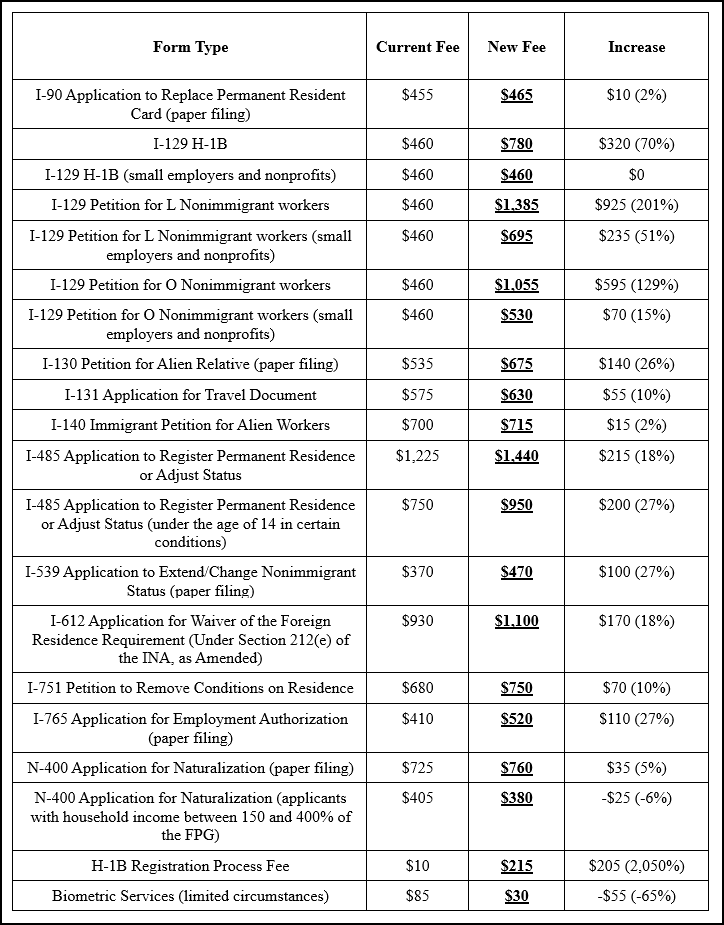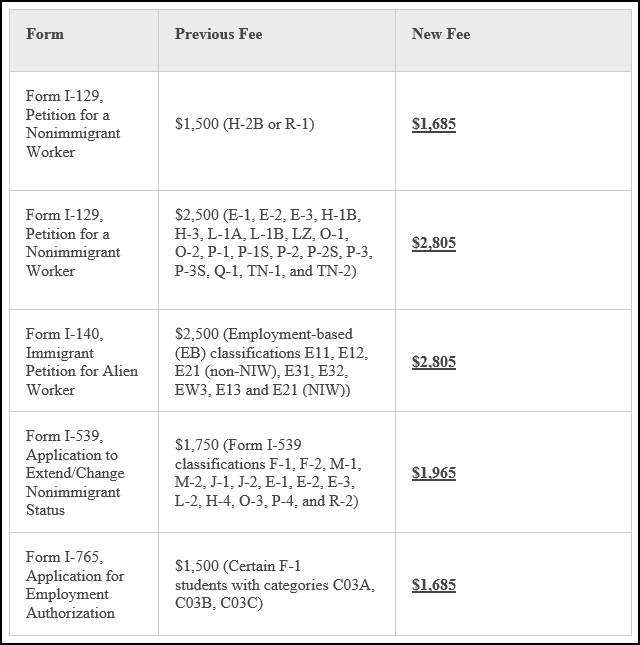On April 1, 2024, USCIS announced that it has received enough electronic H-1B cap registrations during the “initial registration period” to reach the fiscal year (FY) 2025 H-1B cap. It is uncertain whether there will be subsequent H-1B cap selections, based on the actual filings with USCIS.
USCIS will begin accepting H-1B cap petitions as of today, and selected registrants must file their petitions within the filing timeline provided in their selection notice, which will be no more than 90 days.
Please note that USCIS has also updated the Form I-129 and implemented new government filing fees that are also effective today. Specifically, on January 31, 2024, U.S. Citizenship and Immigration Services (USCIS) issued a final rule that increases filing fees for most forms, effective April 1, 2024. See Frequently Asked Questions on the USCIS Fee Rule for a complete list of the new fees, and the table below indicating the fee updates for the most pertinent forms. This change represents USCIS’s first major fee adjustment since 2016. The H-1B cap registration fee will increase next year to $215 per registration.
The final rule also provides for the following changes, among others:
- Distinct fees for Form I-129, Petition for a Nonimmigrant Worker, according to the nonimmigrant classification sought;
- Separate filing fees for Form I-485 (adjustment of status), Form I-131 (advance parole travel document), and Form I-765 (employment authorization), regardless of whether such forms are filed together or not. Exception: USCIS has confirmed that Form I-765 renewal applications based on a pending I-485 application that was filed prior to April 1, 2024 is exempt from the new fee;
- Fee discounts for employers with 25 or fewer full-time equivalent employees, nonprofits meeting the definition in the Internal Revenue Code (IRC) section 501(c)(3), government research organizations, and educational institutions;
- A revised interpretation of the premium processing timeframe from calendar days to business days, allowing USCIS more time to adjudicate premium-processed cases;
- Biometric service fee incorporated into the main benefit fee (except for Temporary Protected Status (TPS) and filings accepted on behalf of the Executive Office for Immigration Review. For these cases, the rule proposes lowering biometric fees to $30 instead of $85);
- Half-price Employment Authorization Document (EAD) applications for applicants for adjustment of status and a reduced fee for adjustment of status applicants under the age of 14, in certain situations;
- Expanded eligibility for a 50% fee reduction for naturalization applications, available to individuals who can demonstrate household income between 150% and 400% of the Federal Poverty Guidelines;
- A $50 discount for online filers; and
- Expanded fee exemptions for Special Immigrant Juveniles and victims of human trafficking, crime, and domestic violence; U.S. military service members and our Afghan allies; and families pursuing international adoption.
For more information regarding these and other changes implemented by the January 31 final rule, please see the USCIS News Release and Frequently Asked Questions on the USCIS Fee Rule.
Previously, on December 27, 2023, USCIS separately announced an increase to premium processing fees. This increase took effect on February 26, 2024. All premium Processing requests postmarked after February 26, 2024 must include the new fee. For further details regarding the increase of the premium processing fees, please see the table below and the relevant USCIS Press Release on the topic.

 Calvin D. Bill
Calvin D. Bill Diane E. Metzger
Diane E. Metzger Melanie Gurley Keeney
Melanie Gurley Keeney Rebecca Martin
Rebecca Martin Robert A. Nickel
Robert A. Nickel
